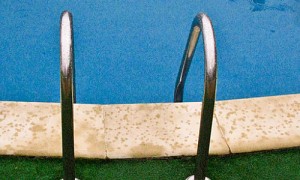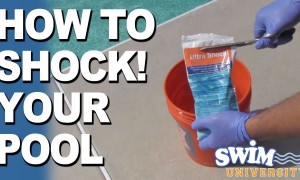Philadelphia doesn’t have long summers, which is why we must take every opportunity to enjoy them. What better way to do that than with a pool? But how do you maintain a pool in your Philadelphia yard? Here are some critical elements to help you keep your pool in working order all summer, as well as a few common mistakes to avoid.
Join the War on Bacteria
As the proud owner of a pool, you are an automatic member of an elite club of bacteria assassins—a group of mercenaries who have been battling pool scum since the dawn of time (well, the dawn of pools). Your first action on your mission to eliminate bacteria, algae, and microorganisms is to choose your weapon wisely. This means selecting the right chlorine.
The two common types of pool chlorine used in Philly are Trichlor, which comes in three-inch tabs, one-inch tabs, and sticks, and Dichlor, which comes in granule form. The right dose of chlorine for your pool varies depending on the brand you use and the size of your pool. Always check the label before chlorinating your pool, and check with your local pool supply shop or pool services company if you still aren’t sure how much to use.
Live for pH
Did you know that the pH level of you pool should be approximately the same level as your tears? The proper pH level for pools is 7.2, although anywhere between 7.2 and 7.6 will do. The pH range of tears is between 6.5 and 7.6.
Regulating the pH of your pool is as important to your pool’s sanitation cycle as chlorine. Pools with proper pH levels will be 10 times more likely to correctly take up chlorine and rid your pool of nasty bacteria.
When testing the pH of your pool, use a drop test pH kit instead of the strip test, as drops allow you to more effectively read the results. Both pH and chlorine levels should be checked twice a week in order to maintain your pool’s chemical balance at ideal levels.
Avoid Mistakes Commonly Made by Philly Pool Owners
Keeping a pool clean and functional isn’t rocket science, even if all the scientific testing makes you feel like a scientist. To ensure you’re operating your pool in a way that is safe and healthy for you and your family, avoid these common Philly pool owner mistakes:
-
Not checking the chemical levels twice a week
-
Letting your pH levels to rise above eight
-
Being unaware of your total dissolved solids (TDS) levels by neglecting to check for calcium hardness
-
Failing to regularly clean the skimmer in the pool pump
-
Adding chemicals in the middle of the day when they are least effective
-
Not activating your pump(s) long enough to promote healthy circulation
-
Not recognizing when equipment needs replacing, like broken or missing drains, gates and suction elements
Now that you know how to maintain a pool, you’re ready for a happy, healthy summer.
[cf]skyword_tracking_tag[/cf]







[…] …read more […]
[…] …read more […]
Using a pool cover can save you in energy and water costs. Covering the pool when the family is done with it for the day can reduce the energy required to the pool water at a swim-friendly temperature. You could potentially save up to 50% on your utility bills (from the amount having a pool has added to your home’s original electric usage).